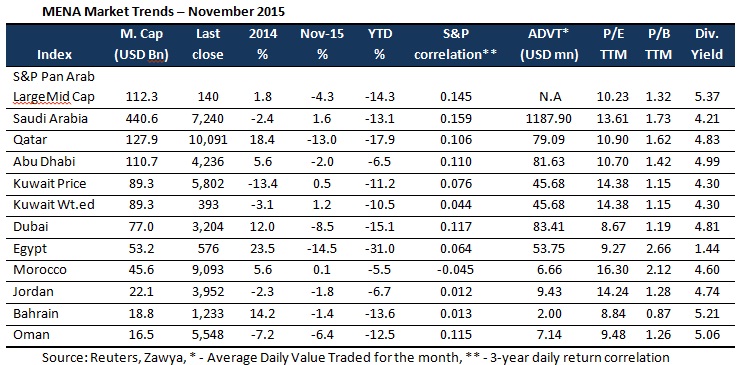Free-falling oil prices torment MENA markets

SABIC (KSA) was the top performing blue chip, gaining 9.1% in November, followed by Emirates Telecom (UAE) and Saudi Telecom (KSA), which gained 7.8% and 4.7%, respectively. Despite SABIC’s Q3 profit falling 9.4% to USD 1.5bn, the company was able to beat analyst estimates by cutting operational costs. Also, SABIC estimates chemical prices to either remain stable or increase in 2016, as China’s economic growth is expected to improve, thereby driving oil demand. The company is also eyeing overseas acquisition to expand its markets geographically. Emirates Telecom has benefited from its decision to allow foreign and institutional investors to own its shares and has rallied since the announcement made during the previous quarter. Qatari companies, Industries Qatar (-18.3%), Ezdan Holdings (-18.0%) and Masraf Al Rayan (-17.4%) were the top three losers in November, as they were affected by the rebalancing of the MSCI emerging markets index and the fall in hydrocarbon price.
Standard & Poor's cut its ratings for Saudi Arabia's long-term foreign and local currency sovereign credit to 'A-plus/A-1', citing a "pronounced negative swing" in the government's budget balance. S&P kept its outlook for the ratings negative, saying it could lower them further in the next two years unless the government managed a large and sustained cut in its deficit. Moody’s has now warned Saudi Arabia of its weakening fiscal position, while keeping its rating unchanged. Saudi Arabian corporate earnings declined during Q3 2015 as low oil prices pulled down the wider economy. Cumulative net income at 166 listed companies dropped 14% from a year earlier to USD 7.4bn.
Saudi Arabia's cabinet recently stated that it was ready to cooperate with OPEC and non-OPEC countries to achieve market stability, before OPEC met on Dec 4 to review its year-long policy of not supporting prices. But the OPEC members were not able to agree on a production ceiling as Iran wanted to scale back its production to levels prior to western sanctions before it considers production curb, which led to further decline in oil price. The market remains over-supplied, with production having risen to a record 97.09mbpd.
